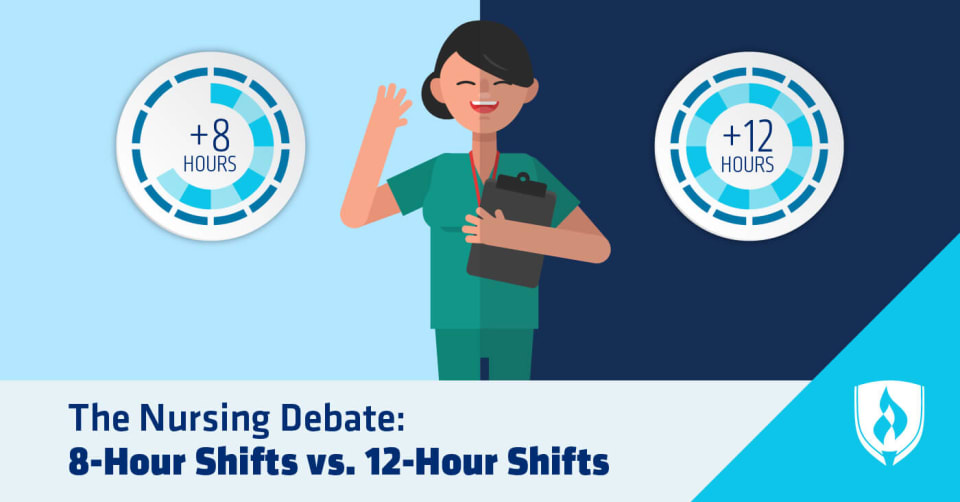There were the Hatfields and the McCoys. The Sharks and the Jets. The Yankees and the Red Sox. And then there was the 8-hour versus 12-hour nursing shift debate.

It’s a hotly contested one in the nursing community, with pushback from both sides. 8-hour shifts dominated a nurse’s career in the past, but the majority of nurses now work longer ones. 12-hour shifts look great on paper but can easily morph into thirteen hours or longer due to handoff procedures or patient demand. Facilities largely rely on 12-hour shifts, which many nurses favor. Still — concerns linger over the safety and effectiveness of clocking longer hours.
Join us as we take a closer look at the potential benefits and risks at the bedside and in the nursing profession.
Get Your Nursing School Questions Answered at a Nursing Information Session
The case for 8-hour nursing shifts
1. Longer shifts increase fatigue
You may sign up for a 12-hour shift, but many in the industry say a 12-hour shift can quickly spill into overtime, whether voluntary or not. And despite regulations on shift length and cumulative working hours for resident physicians and workers in other industries, there are no national work-hour policies for registered nurses.
Studies show that nurses who clocked long hours three consecutive days in a row displayed a pattern of sleep deprivation and slower reaction time. The problem was the same regardless if nurses were working day shifts or night shifts.
2. Shorter shifts can result in less burnout
Studies show that nurses who work longer hours exhibit higher instances of burnout. Nurses who worked shifts 10 hours or longer were two and a half times more likely to experience burnout and job dissatisfaction, according to a study by the National Institute of Nursing Research (NINR). And burnout can cause employers to lose valued employees — the study also showed that these nurses were more likely to leave their jobs.
3. Shorter shifts improve patient satisfaction
Patients were less satisfied when their nurses worked 13 or more hours, and more satisfied when their nurses worked 11 or fewer hours, according to a study by NINR.
4. Shorter shifts have fewer errors
Nursing is a grueling career — physically, mentally and emotionally. The strains of long shifts can manifest in mistakes — mistakes with great consequences. Nurses working overtime or working shifts longer than twelve hours experienced significantly more errors or near errors, according to a study conducted by the Agency for Healthcare Research and Quality.
5. Shorter shifts result in fewer on-the-job injuries
Studies show that nurses, especially newer ones, working longer hours are more susceptible to workplace injuries such as strains and needle sticks.
6. Longer shifts can be detrimental to a nurse’s health
Nurses who regularly work long hours may see a negative impact on their health. Studies found a link between a nurse’s long hours and an increased risk for a multitude of health issues, including musculoskeletal disorders, gastrointestinal problems, gastric ulcers, obesity, diabetes mellitus, metabolic syndrome, cardiovascular disease and cancer.
The case for 12-hour nursing shifts
1. Longer shifts promise less patient turnover
The most prominent benefit of longer shifts is the decrease in handoffs. Instead of three or more nurses attending to a patient in the span of one day, only two are needed with 12-hour shifts. Less handoffs between nurses mean less reports and less chances for miscommunication and possible error.
2. Longer shifts can provide better work-life balance
Instead of having downtime at home for a few hours each night, plus your traditional two-day weekend, nurses who work 12-hour shifts often have a four-day weekend.
3. Longer shifts mean less commuting
With a shorter workweek comes this obvious benefit — fewer commuting days — especially if you live far from work or sit in traffic each night.
4. Longer shifts offer greater flexibility for nurses
The longer block of time at home makes for more flexibility in a nurse’s life — especially if they pursue further education, raise a family or choose to pick up extra shifts.
5. Longer shifts are easier to schedule
Longer shifts for nurses make for easier scheduling, from a managerial standpoint. It’s one less shift to schedule every day.
6. Longer shifts improve morale
Flexible scheduling options, such as the 12-hour shift, improve absenteeism amongst nurses, boost morale and increase retention.
Which shift do you support?
While the flexibility of the 12-hour shift may appeal to nurses, the longer hours undeniably have their share of risks too. There’s a very fine line in which the benefits can quickly turn into consequences. With the nursing community still split, the heated shift debate is undoubtedly far from over.
Whether you’re clocking long hours or rocking the regular eight, learn how to improve yourself and get ahead in your nursing career in our article: Nursing Career Advancement: 7 Ways to Stand Out in Your Scrubs.
RELATED ARTICLES:
- The Best Day on the Job: 4 Nursing Stories that Prove it's All Worth it
- Teamwork in Nursing: How to be a Key Contributor in Your Unit
- 10 Tips for New Nurses Dealing with Difficult Patients
EDITOR'S NOTE: This article was originally published in April 2013. It has since been updated to include information relevant to 2016.




